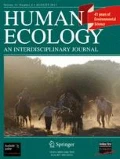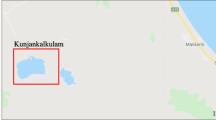Abstract
I investigate how small-scale fishing communities in the Northern and Southern Group of the Cook Islands understand global climate change through lived experiences rather than through Western scientific knowledge, which often exists at a global rather than local level and infrequently reaches local communities. Responses to qualitative interviews illustrate how local communities and scientists communicate differently about environmental phenomena that are often viewed at different scales. My results also show that while all interviewees have experienced first-hand the effects of climate change, understanding of climate change at the local level is not homogenous. I discuss the importance of bridging the gap between traditional and scientific ways of knowing by ensuring scientific knowledge reaches local communities in accessible and useful form, and by incorporating traditional ecological knowledge (TEK) as well as scientific knowledge into climate change related policy making at both local and national levels.

Similar content being viewed by others
References
Allison, E. H., & F. Ellis. 2001. “The livelihoods approach and management of small-scale fisheries.” Marine Policy 25(5): 377-88.
Allison, Edward H., Allison L. Perry, Marie-Caroline Badjeck, W. Neil Adger, Katrina Brown, Declan Conway, Ashley S. Halls et al. 2009. "Vulnerability of national economies to the impacts of climate change on fisheries." Fish and fisheries 10 (2): 173-96.
Antwi-Agyei, Philip, Andrew J. Dougill & Lindsay C. Stringer. 2015. “Barriers to climate change adaptation: evidence from northeast Ghana in the context of a systematic literature review.” Climate and Development 7(4): 297-309
Aswani, Shankar and Matthew Lauer. 2006. “Benthic mapping using local aerial photo interpretation and resident taxa inventories for designing marine protected areas.” Environmental Conservation 33(3): 263-73.
Australian Bureau of Meteorology and CSIRO. (2011). Climate Change in the Pacific: scientific assessment and new research. Vol. 1: Regional Overview. Vol. 2: Country Reports.
Beaudreau, A. H., & P.S. Levin 2014. “Advancing the use of local ecological knowledge for assessing data-poor species in coastal ecosystems.” Ecological Applications 24(2): 244-56.
Berkes, F., & N.J. Turner. 2006. “Knowledge, learning and the evolution of conservation practice for social-ecological system resilience.” Human ecology 34(4): 479.
Berkes, F., J. Colding, and C. Folke. 2000. “Rediscovery of traditional ecological knowledge as adaptive management.” Ecological applications 10(5): 1251-62.
Betzold, C. 2015. “Adapting to climate change in small island developing states.” Climatic Change 133(3): 481-489.
Buys, L., E. Miller, and K. van Megen. 2012. “Conceptualizing climate change in rural Australia: community perceptions, attitudes and (in) actions.” Regional Environmental Change 12(1): 237-48.
Chapman, L. (2000). Small-scale FAD associated fishing techniques used in the Pacific region. Pêche thonière et dispositifs de concentration de poissons, Caribbean-Martinique, 15–19 Oct 1999. https://archimer.ifremer.fr/doc/00042/15295/
Dangendorf, S., M. Marcos, G. Wöppelmann, C.P. Conrad, T. Frederikse, and R. Riva. 2017. “Reassessment of 20th century global mean sea level rise.” Proceedings of the National Academy of Sciences 114(23): 5946-51.
DeCelles, G. R., D. Martins, D.R. Zemeckis, and S.X. Cadrin. 2017. Using Fishermen’s Ecological Knowledge to map Atlantic cod spawning grounds on Georges Bank. ICES Journal of Marine Science 74(6): 1587-1601.
de Scally, Fes A. 2008. Historical Tropical Cyclone Activity and Impacts in the Cook Islands Pacific Science 62(4):443-459
Diggles, Ben, P. Mike Hine and Jeremy Carson. 2007. The Cook Islands experience: pearl oyster health investigations. In Pearl oyster health management a manual. FAO Fisheries Technical Paper No. 503, M.G. Bondad-Reantaso, S.E. McGladdery and F.C.J. Berthe, 71-85. Rome: FAO.
Du, Z., L. Ge, A.H.M. Ng, Q. Zhu, Q. Zhang, J. Kuang, and Y. Dong 2019. Long-term subsidence in Mexico City from 2004 to 2018 revealed by five synthetic aperture radar sensors. Land Degradation & Development 30(15): 1785-1801.
Fernández-Llamazares, Á., R.A. Garcia, I. Díaz-Reviriego, M. Cabeza, A. Pyhälä, and V. Reyes-García. 2017. An empirically tested overlap between indigenous and scientific knowledge of a changing climate in Bolivian Amazonia. Regional Environmental Change 17(6): 1673-85.
Finney, B. 1991. Myth, experiment, and the reinvention of Polynesian voyaging. American Anthropologist 93(2): 383-404.
Graham, N. A., S. Jennings, M.A. MacNeil, D. Mouillot, and S.K. Wilson 2015. Predicting climate-driven regime shifts versus rebound potential in coral reefs. Nature, 518(7537), 94.
Haas, A., T. Rongo, N. Hefferman, S. Harper, and D. Zeller 2012. Reconstruction of the Cook Islands fisheries catches: 1950–2010. In Fisheries Centre Research Reports 20(5): Fisheries catch reconstructions: Islands, Part III, edited by S. Harper, K. Zylich, L. Boonzaier, F. Le Manach, D. Pauly, D. Zeller, 15-24. Vancouver: The Fisheries Centre
Hallegatte, S. and J. Rozenberg. 2017. Climate change through a poverty lens. Nature Climate Change 7(4): 250.
Hamilton, R. J., M. Giningele, S. Aswani, and J.L. Ecochard. 2012. Fishing in the dark-local knowledge, night spearfishing and spawning aggregations in the Western Solomon Islands. Biological Conservation 145(1): 246-57.
Hanazaki, N., F. Berkes, C.S. Seixas, and N. Peroni. 2013. Livelihood diversity, food security and resilience among the Caiçara of coastal Brazil. Human Ecology 41(1): 153-64.
HLPE. (2014). Sustainable fisheries and aquaculture for food security and nutrition. A report by the High Level Panel of Experts on Food Security and Nutrition. Rome
Hoffmann, T. C. 2002. The reimplementation of the Ra'ui: Coral reef management in Rarotonga, Cook Islands. Coastal Management, 30(4), 401-418.
Hughes, T.P., J.T. Kerry, M. Álvarez-Noriega, J.G. Álvarez-Romero, K.D. Anderson, A.H. Baird,... and T.C. Bridge. 2017. Global warming and recurrent mass bleaching of corals. Nature 543(7645): 373.
Hviding, Edvard. 2018. The River, the Water and the Crocodile in Marovo Lagoon. Island Rivers: Fresh Water Places in Oceania, John R. Wagner and Jerry K. JackaAustralia: ANU Press.
Jeanne, P., T.G. Farr, J. Rutqvist, and D.W. Vasco. 2019. Role of agricultural activity on land subsidence in the San Joaquin Valley, California. Journal of hydrology 569: 462-9.
Johannes, R.E. 1998. “The case for data-less marine resource management: examples from tropical nearshore finfisheries.” Trends in Ecology & Evolution 13(6): 243-246.
Lauer, Matthew and Jaime Matera. 2016. Who detects ecological change after catastrophic events? Indigenous knowledge, social networks, and situated practices. Human ecology 44(1): 33-46
Mackay, Samuel, Rebecca Brown, Makelesi Gonelevu, Netatua Pelesikoti, Talei Kocovanua, Rebecca Iaken,… and Brendan Mackey. 2019. Overcoming barriers to climate change information management in small island developing states: lessons from pacific SIDS. Climate Policy 19(1): 125-38.
Matera, Jaime. 2016. Livelihood diversification and institutional (dis-) trust: Artisanal fishing communities under resource management programs in Providencia and Santa Catalina, Colombia. Marine Policy 67: 22-9.
Ministry of Finance and Economic Management. (2019). Cook Islands Statistical Bulletin. Vital Statistics and Population Estimates March Quarter 2019. Government of the Cook Islands.
Ministry of Marine Resources. (2014). Cook Islands Offshore Fisheries Annual Report 2014. Government of the Cook Islands.
Ministry of Marine Resources. (2015). Cook Islands Offshore Fisheries Annual Report 2015. Government of the Cook Islands.
Ministry of Marine Resources. (2016). Cook Islands Offshore Fisheries Annual Report 2016. Government of the Cook Islands.
Ministry of Marine Resources. (2017). Cook Islands Offshore Fisheries Annual Report 2017. Government of the Cook Islands.
Morales-Reyes, Z., B. Martín-López, M. Moleón, P. Mateo-Tomás, P.P. Olea, E. Arrondo,... and J.A. Sánchez-Zapata. 2019. Shepherds’ local knowledge and scientific data on the scavenging ecosystem service: Insights for conservation. Ambio 48(1): 48-60.
Nerem, R. S., B.D. Beckley, J.T. Fasullo, B.D. Hamlington, D. Masters, and G.T. Mitchum. 2018. Climate-change–driven accelerated sea-level rise detected in the altimeter era. Proceedings of the National Academy of Sciences 115(9): 2022-25.
Oakes, R. 2019. Culture, climate change and mobility decisions in the Pacific Small Island Developing States. Population and Environment. 40(4): 480-503.
Olsson, P. and C. Folke. 2001. Local ecological knowledge and institutional dynamics for ecosystem management: a study of Lake Racken watershed, Sweden. Ecosystems 4(2): 85-104.
Power, Hannah, Remo Cossu, David P. Callaghan, and Michel G. Hughes. 2017. Lagoon stratification in Manihiki Atoll, Cook Islands. Coasts & Ports 2017 Conference. Cairns, 21–21 June 2017.
Ridgway, N.M. 1974. Hydrology of Manihiki Lagoon. In Contributions to the Natural History of Manihiki Atoll, Cook Islands, Bullivant, J.S. and Charles McCann. 23. Wellington: Shearer Government Printer.
Rongo, T., and C. Dyer. 2014. Using local knowledge to understand climate variability in the Cook Islands. Rarotonga: Government of the Cook Islands.
Saylor, C. R., K.A. Alsharif, and H. Torres. 2017. The importance of traditional ecological knowledge in agroecological systems in Peru. International Journal of Biodiversity Science, Ecosystem Services & Management 13(1): 150-61.
Shackleton, S., G. Ziervogel, S. Sallu, T. Gill, and P. Tschakert. 2015. Why is socially-just climate change adaptation in sub-Saharan Africa so challenging? A review of barriers identified from empirical cases. Wiley Interdisciplinary Reviews: Climate Change 6(3): 321-44.
Sugandika, T. A., D.P. Callaghan, and P. Nielsen, P. 2013. “Atoll lagoon flushing at Manihiki in the Cook Islands.” Sydney: Coasts and Ports.
United Nations (2017). The Ocean Conference. Factsheet: People and Oceans. New York, 5–9 June 2017
Walshe, R. A., D. Chang Seng, A. Bumpus, and J. Auffray. 2018. Perceptions of adaptation, resilience and climate knowledge in the Pacific: The cases of Samoa, Fiji and Vanuatu. International Journal of Climate Change Strategies and Management 10(2): 303-22.
Zhu, L., H. Gong, X. Li, R. Wang, B. Chen, Z. Dai, and P. Teatini. 2015. Land subsidence due to groundwater withdrawal in the northern Beijing plain, China. Engineering Geology 193: 243-55.
Acknowledgements
I thank the Cook Islands Government for facilitating research permits, the communities of Mauke and Manihiki, including the Ariki and Island Councils, for allowing research on their islands, and the individuals who contributed their time and knowledge to the success of this study.
Funding
This research project was funded by a California State University Channel Island’s Faculty Research & Development MiniGrant.
Author information
Authors and Affiliations
Corresponding author
Ethics declarations
Conflict of Interest
The author declares that there is no financial or non-financial conflict of interest.
Informed Consent
All participants in this study signed an informed consent form and received a copy. The author followed research protocols approved by California State University Channel Islands Institutional Review Board.
Additional information
Publisher’s Note
Springer Nature remains neutral with regard to jurisdictional claims in published maps and institutional affiliations.
Rights and permissions
About this article
Cite this article
Matera, J. Bridging Traditional and Scientific Knowledge of Climate Change: Understanding Change Through the Lives of Small Island Communities. Hum Ecol 48, 529–538 (2020). https://doi.org/10.1007/s10745-020-00186-w
Accepted:
Published:
Issue Date:
DOI: https://doi.org/10.1007/s10745-020-00186-w




